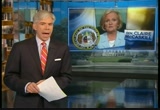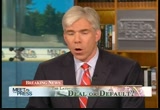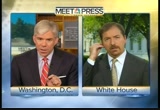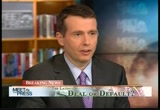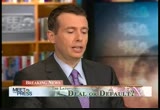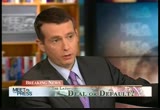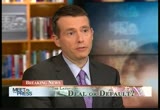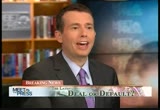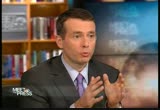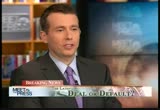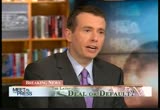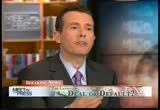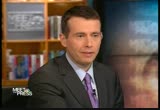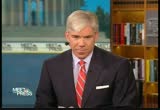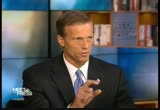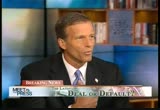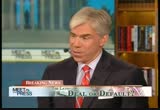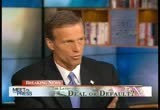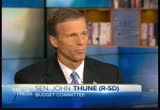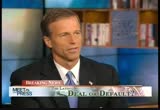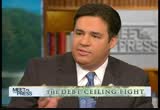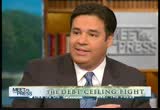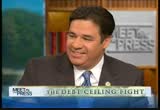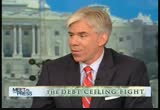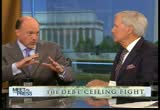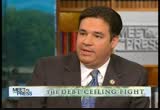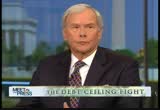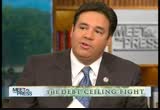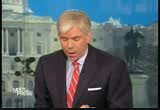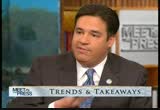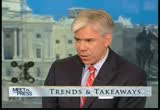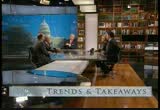tv Meet the Press MSNBC July 31, 2011 2:00pm-3:00pm EDT
2:00 pm
this sunday, the final showdown over the debt ceiling just two days before a potential u.s. default. as wall street braces for a market shock, will congress and the president compromise before the deadline? and with high unemployment and slower growth, how much more can the economy take? >> the power to solve this is in our hands. and on a day when we've been reminded how fragile the economy already is, this is one burden we can lift ourselves. >> but house republicans dig in.
2:01 pm
>> i stuck my neck out! >> blaming the white house and democrats for failing to lead. >> it is time for the administration and time for our colleagues across the aisle to put something on the table! tell us where you are! >> this morning, the political fight, the end game, and the economic fallout. with us, the president's senior adviser, david plouffe. then, the latest on the negotiations in the senate with senator john thune, republican of south dakota, and senator claire mccaskill, democrat of missouri. finally, the "political roundtable." our focus, the political landscape and the debt crisis. is our leadership bankrupt? and what high economic stakes mean to you. with us, nbc news special correspondent tom brokaw, former democratic governor of michigan jennifer granholm, host of cnbc's "mad money," jim cramer,
2:02 pm
and a tea party-backed freshman republican congressman from idaho, raul labrador. good morning. still an unfolding story here in washington, the battle over raising the debt ceiling has entered its final hours. after weeks of negotiations, pointed political debate, some signs now that a compromise plan between congressional leaders and the white house could emerge as early as today. the senate majority leader, harry reid, postponed an overnight vote on his own debt limit measure and announced late last night that the senate would instead reconvene at noon today and hold off to the vote at 1:00 p.m. eastern time. >> there are many elements to be finalized, many elements to be finalized, and there is still a distance to go before any arrangement can be completed, but i believe we should give everyone as much room as
2:03 pm
possible to do their work. >> signs of progress also echoed by republican senate leader mitch mcconnell and speaker boehner. >> our country is not going to default for the first time in history. that is not going to happen. we now have, i think, a level of seriousness with the right people at the table that we needed and thought we had, as the speaker indicated, last weekend. we're going to get it resolved. >> i think it's pretty clear, should be clear to all of you, that senator mcconnell and i believe that we're going to be able to come to some agreement to end this crisis as soon as possible. >> to the white house now. our chief white house correspondent chuck todd is standing by. chuck, how close? >> reporter: david, they're very close. they've agreed on the framework as far as we know, and the framework is this -- the agreement that the debt ceiling will be raised past 2012, the agreement that we're talking about cuts only, about $1 trillion up front in this first six months and then about $1.8 trillion in cuts for the rest of 2012.
2:04 pm
now, what had been the sticking point for the last three weeks had been this issue of an enforcement mechanism, what will force congress to do these cuts? republicans, of course, wanted another vote on the debt limit. that is not something the white house wants. so what was agreed to is an across-the-board cut. so, if this supercommittee that is created cannot come up with the cuts, there will be an across-the-board cut that will include medicare, it will include the pentagon, and it will be a tough spending cut that would start in 2013 and one that would be painful for both parties, david. >> the sticking point is still the house of representatives. they passed a different sort of bill. compromise does not look likely there. how tricky is that vote? >> reporter: well, the tricky part might be now democrats. republicans feel pretty good about this deal at this point, and so, republicans think they can get a lot of votes, perhaps 180 to 200 republicans, and
2:05 pm
therefore, you'd only need about 30 or 40 democrats. so, that they feel good about. but david, we're up against a legislative clock and the default clock. so, don't be surprised if there's a temporary extension, if necessary, to get the final details done, because they're not done with some of the details, and some democrats are not happy. >> all right, chuck todd, thank you very much, from the white house north lawn. i'm joined by senior adviser to the president, david plouffe. welcome back to "meet the press." >> good morning, david. >> from your vantage point, you're inside the room, is that overly rosy or are you that close? >> well, we don't have a deal. everyone is cognizant, as chuck todd just reported, on both the legislative clock and more importantly, the default clock, so the hours are ticking here. i think what's clear is that there is general agreement that we're going to have deficit reduction in two stages. the first is going to be something the parties largely agree on, about $1 trillion in deficit reduction. the second stage is going to be the trickier elements of entitlement reform and tax reform, which this supercommittee is going to be charged with, and i think it will be incumbent on the members of congress to appoint people to those committees who are going to drive to yes, to try to compromise, get out of their party's comfort zone. >> let me be clear, though, what will the president accept as a deal?
2:06 pm
>> well, first of all, it's clear, our economy is obviously not as strong as any of us would like it to be. this debt ceiling cloud has harmed our economy. why on earth would we want to go through this again a few short months from now? >> so it has to be through 2012? >> for the economy, number one. number two, we want to make sure that if there is an enforcement mechanism -- and again, the committee is not going to be charged with just doing spending cuts only. the committee will be charged at looking at our entire deficit reduction problem and look at things like tax reform and revenue. you want something to compel this committee to act. that was part of the president's approach that he laid out for the country a few months ago, that there would be a debt cap that would enforce action. so, you want to have something that will compel both parties to act, because i do think there is going to be a lot of pressure on this committee to produce something congress can vote on. >> but a lot of people watching are wondering what's actually going on today, what is the fighting about? so, first stage, you cut government spending over a ten-year period to raise the debt ceiling.
2:07 pm
part of that is a second stage, another committee in washington looks at really making the hard decisions. and then if they don't make the hard decisions, something forces congress's hand. so again, what will the president accept as a consequence to force the congress's hand? >> again it might be more enjoyable to negotiate this with you this morning. i can't get into a great amount of detail, but i think that, one, we have to make sure that you can agree on the initial set of spending cuts. the process for the committee, it's essential we think that the debt ceiling get extended off into the future so it doesn't hurt the economy. then we want to make sure whatever enforcement mechanism is something, one, that if it were triggered, you know, you think the country could live with, but secondly, strong enough to compel folks to act. i think you'll see -- this has been a healthy debate. i think the country's learned a lot about our debt and deficit problems, i think there's been some education here in washington, and i think what's clear is, you know, where the president stands is where the american people stand, that if we're going to do another set of deficit reduction, over $1 trillion, they're going to insist it be balanced.
2:08 pm
because if you're a middle class family, if you're a senior citizen -- >> but there's no tax increases in this. the president said it had to have tax increases, had to be balanced. that's not what's in this deal. >> this committee will be charged with coming up with additional deficit reduction and there's no way to do it without smart entitlement reform and tax reform. >> so, you only get to potential tax increases as part of the second stage of spending cuts that a committee has to agree to? >> well, the first stage, it's clear this first stage what we're going to get is an extension of the debt ceiling, you're going to get the first set of spending cuts, over $1 trillion, and then you'll get this committee charged with reporting out, hopefully, a balanced deficit reduction package. >> but what is healthy about this debate? you're talking about another supercommittee. 17 months ago, the president convened a debt commission. the proposed recommendations, which were not acted on by president or congress. now you're talking about another committee. nobody's yet making the hard choices about two-thirds of the budget, which is entitlement spending.
2:09 pm
so, what's healthy about this debate? >> well, it's certainly not been a healthy debate in the short term. i think the american people are sitting back and saying, you know, i'm going through tough things in my life, and these folks are sitting there arguing with each other, unwilling to compromise, particularly the house republicans this week. but i would say this -- the president laid out several months ago a $4 trillion deficit reduction plan. what we were striving to do with the speaker of the house was a big deficit reduction package that wouldn't have a supercommittee. we would have done it right now. that wasn't possible. the speaker of the house pulled by the right wing of his party, walked away from it. but the president's going to be committed over these next few months, as i think members of congress need to be as well, that we need to finish the job here, and the way you're going to finish that job is to have a balanced deficit reduction package that doesn't harm the economy. >> let me ask you some other pressing matters. i've spoken to top figures on wall street who say this is a code red day, all hands on deck, preparing for a market shock as early as tomorrow. what is your message?
2:10 pm
what is the president's message to investors around the globe this morning? >> well, i think it is that we have to get this solved. today is obviously a critical day. we have to give confidence that there is a pathway to make sure that we both reduce the debt ceiling, and let's not underestimate the deficit reduction is an important part of this, so i think -- >> but that doesn't sound like a certain message to investors. should they be swayed by that? >> the way we're going to persuade investors and the american people is to solve this problem. and i think in the coming hours, and we're literally talking about the coming hours, i think we can count on congressional leaders to compromise that last bit so we can have a deal that, again, the house republicans, mysteriously, because i don't know anyone who watches this who would think this is a good idea, wanted us to go through this whole three-ring circus again in four or five months. we're not going to do that because it's bad for the economy. >> if we have a default, who gets paid first?
2:11 pm
how does treasury make that decision? >> listen, at the appropriate point, the treasury department will obviously lay out for the american people how this is going to operate. our focus right now is solving this problem. if we're not able to reach a deal, then treasury's going to have to report to the american people exactly how this is going to happen. >> chairman mullen is in afghanistan. he told our troops fighting there he didn't know the answer to when and where they would get paid. will the president insist that if there's a default, the troops will get paid? >> again, the treasury department -- by the way, whatever admiral mullen talked about, it's outrageous that here we are, 60 hours away from the united states of america potentially defaulting for the first time. and the reason we're here is that, particularly republicans in the house, but republicans generally had been unwilling to compromise. so, at the appropriate point, if we get to that point, the treasury department will lay out clearly for the american people, most importantly for investors, folks around the world, exactly what would happen if we default. >> i want to be clear on what the president would accept in terms of cuts, in the first
2:12 pm
stage or the second stage. in other words, that what's called in washington a trigger, which means that whatever force's congress's hand, if they don't continue to cut government spending, something would happen. we know the president is open to tax increases automatically. would he also accept a deal that would cut social security benefits or medicare benefits if congress doesn't act? >> well, first of all, when you say open to tax increases, let's remember what the president's for, closing tax loopholes, making sure that millionaires and billionaires, large corporations, through tax reform, contribute. what you see the republican party largely wanting to do is ask senior citizens, college students and the middle class to pay all the freight here, and people are outraged by that. everyone's going to have to do their part here. so, in deficit reduction -- and again, this next stage, the first stage is going to be some domestic spending cuts in defense and on defense that both parties largely can come to an agreement on. not easy, but a first stage. second stage is going to be a discussion in congress about
2:13 pm
things like tax reform and entitlement reform. our view is, things like social security and medicaid, you know, they can't be part of the solution here unless you've got a balanced package that includes tax reform. >> so, we're still at a stalemate when it comes to that, in terms of that second stage. another option that's been talked about and there's been pressure from democrats, is invoking the 14th amendment. this is a key piece of the 14th amendment, "the validity of the public debt of the united states authorized at law shall not be questioned." the president can unilaterally raise the debt ceiling. will he do that, if it comes to that? >> we've been asked this a lot, and i think particularly as you come to the closing hours of this crisis, a lot of people are suggesting offering. there is no offering here. you know -- >> so, the 14th amendment is not an option? >> no. we've looked at that. the only way out of this is for congress to act, for the republicans in congress to be willing to compromise a little
2:14 pm
bit. you know, the debt ceiling's been raised dozens of times historically. it shouldn't take, you know, a constitutional crisis for us to pay the bills on our credit cards that congress has already racked up. >> the backdrop for this, as you know, is the economy in trouble. the "wall street journal" described it this way in terms of economic recovery. this was yesterday. "the government on friday reported that the economy grew at a rate of just 1.3% in the second quarter, failing to bounce back from knocks earlier in the year. estimates of first-quarter growth were also revised down to 0.4%. as a result, the pace of the economic recovery has been one of the worst since world war ii. that's particularly bad news as the economy confronts the threat of a default on the nation's debt." is the obama recovery much more like a bust? >> no. what also was reported this week, is you went back three years, and the depth of the recession the president inherited was worse than when fdr inherited the depression. so, we had growth in negative 6, negative 7, just terrible. so, what we have to do is -- now
2:15 pm
from those terrible depths, we've made progress. we continue to see positive job growth, but not nearly enough. first of all, this debt ceiling cloud not just harmed investors, it's going to harm business confidence small and large. between remove this cloud. secondly, congress can do things right now. we can pass trade deals that can help us compete. we can pass a patent reform so that our innovators have an easier time getting their ideas to market. we can work together to build roads and bridges and put construction workers back to work. we have a payroll tax looming, by the way, that would expire next year, about $1,000 tax increase on each american if we don't pass it. so, we've got to get through this debt ceiling for a lot of reasons, but the focus in washington has to go back to how we're going to create jobs and how we're going to grow this
2:16 pm
economy. >> before you go, you are the president's top political adviser. as you look at what washington has done, essentially a failure to govern, do you now think a third party is a viable alternative in the 2012 race? >> well, that will be up to the american people. here's what i would say -- >> you're the expert inside the white house. >> well, i can speak to this. i think that most americans believe that the president has tried to tackle tough problems. i think they're clear that here is a president who is willing to do some tough things, that obviously, we took some criticism from our own party on. so, he walked the walk in terms of how we solve the deficit. someone who's clearly been willing to compromise. and what's interesting is the president last monday night in a speech to the nation and again friday asked the american people to reach out to congress through tweets, e-mails and calls, and say demand a compromise, and the reaction was overwhelming. i think people are very frustrated, and they want their leaders, obviously, to have strong principles. but at the end of the day, as they're going through the struggles in their everyday life, what they can't afford is for their leaders to be engaged in a three-ring circus.
2:17 pm
>> does it open up a third party or not? >> well, listen, you know, that will be up to the american people. what i'm confident in is that the president's leadership is something that was rewarded in 2008. i think people think he's the one person here who's focused every day on solving problems, not trying to score political points, and that's going to be one of the reasons he'll be re-elected in 2012. >> all right, we've got to leave it there. david plouffe, we'll be watching. thank you very much. coming up, more on this deal or default. all eyes on negotiations in the senate as the clock ticks towards a looming debt deadline. so, how does a final deal get done? we'll get into the negotiations. democratic senator claire mccaskill will be here and republican senator john thune. they'll join me next. [ male announcer ] this is the network. a network of possibilities. excuse me? my grandfather was born in this village. [ automated voice speaks foreign language ] [ male announcer ] in here, everyone speaks the same language. ♪ in here, forklifts drive themselves.
2:18 pm
no, he doesn't have it. yeah, we'll look on that. [ male announcer ] in here, friends leave you messages written in the air. that's it right there. [ male announcer ] it's the at&t network. and what's possible in here is almost impossible to say. my son and i never missed opening day. but with copd making it hard to breathe, i thought those days might be over. so my doctor prescribed symbicort. it helps significantly improve my lung function, starting within 5 minutes. symbicort doesn't replace a rescue inhaler for sudden symptoms. with symbicort, today i'm breathing better, and that means... game on! symbicort is for copd, including chronic bronchitis and emphysema. it should not be taken more than twice a day. symbicort may increase your risk of lung infections, osteoporosis, and some eye problems. tell your doctor if you have a heart condition or high blood pressure before taking it. [ whistle ] with copd, i thought i might miss out on my favorite tradition. now symbicort significantly improves my lung function,
2:19 pm
2:20 pm
coming up, down to the wire on a debt deal. how does this deal finally get done to avoid default. democratic senator claire mccaskill, republican senator thune, republican of south dakota, and senator claire senr [ melody ] the bar is raised for everybody in an ap class, from the teachers to the students. i had a student the other day that said... "miss stacy, this class is changing the way that i look at things." sparking that interest and showing them that math and science are exciting... it's why i teach. ♪ i know they can, even when they think they can't.
2:23 pm
joining me, senator john thune, republican of south dakota, and senator claire mccaskill, democrat of missouri. welcome both of you to "meet the press." well, this is really where the action is right now. it's in the senate. senator thune, as a republican here, somebody who's reportedly in play, what has to be in this agreement to get you to yes? >> well, i think a couple things, david. first, no taxes, spending reductions at least equal to the amount that the debt limit would be increased by, dollar for dollar, and i think a pathway to get a result on entitlement reform. those are the elements that i think a lot of republicans are going to be looking for in order to support a final bill. >> so, you heard david plouffe a minute ago, that mcconnell is saying there's no tax increases in this deal, and that's true, but there is still, again, another committee that's going to look at making the hard decisions about entitlements and tax reform, and the president, you know, is going to look at that committee for tax increases to be part of that approach. >> well, i think there will be
2:24 pm
some who want to see taxes as part of the approach. i certainly don't, and i don't think most republicans do and i think we believe that if tax reform is a part of that discussion of the permanent committee, and it certainly can be, it ought to be with an eye toward broadening the base, lowering the rates, and getting the economy growing again. tax reform can be a very useful tool in terms of economic growth, but i don't think tax increases are on the agenda of any republican in the house or senate. >> can you vote for what's taking shape right now, as you know about it? >> it's hard to say because we haven't seen the details. i don't like where this is headed. i'm not a big fan of the joint committee. but remember, this is probably going to be as good of an outcome as we can get, and most of us will have to accept things we don't like in the final product. >> senator mccaskill, you were in your office yesterday. we have pictures of you on the phone talking to constituents. and you sent out a tweet during the day that caught my eye -- "just spent a couple hours answering the phone in my office. dominant message, don't cut social security or medicare and compromise." and yet, the big fight we know right now is over the
2:25 pm
enforcement mechanism. again, more washington talk. what it means is you cut a certain amount up front to raise the debt ceiling, and then there's a second stage of cuts that comes, and there is this committee that tries to agree on those cuts. and if you don't do it over this ten-year span, something forces congress's hand. so, how do you not put social security benefits or medicare benefits into that potential enforcement mechanism when they're what are driving the debt? >> well, i think you have to have a lot of faith that the american people are going to continue to weigh in. and here's the bottom line -- this fight has not been about nothing. this hasn't just been political theater. there's a philosophical difference here on the hill between the democratic party and the republican party, and it's pretty simple. they have voted to keep giving taxpayer checks to big oil while they voted to convert the medicare system to vouchers. now, that doesn't compute for us. how can you be more willing to push money, public money, to the
2:26 pm
most profitable corporations in the history of the world at the same time you're willing to dismantle medicare. so, that's really the fight here. so, if they're not willing to look at -- and you know, john and i agree that we can do tax reform, but we can generate revenues there by leveling the playing field, by lowering tax rates for businesses and individuals, but let's get away from the situation where the people who have power in washington don't have to pay any taxes. >> what's ludicrous to the american people, even when the american people don't always speak with one voice on this matter, is that washington is not really dealing with what really drives the debt. that's entitlement spending. that's been going on this way and has been a ticking time bomb since the '60s. and democrats, like you were saying, hey, we can't deal with social security and medicare -- republicans say, you know, sign tax pledges that i'm not going to raise taxes. well, we can't deal with revenues. this is what's ludicrous to the american people. even here, if we have a deal, we'll solve the political problem, but not the underlying
2:27 pm
fiscal problem which creates our debt, senator, no? >> i think what absolutely drives government spending more than anything else is basically three programs -- medicare, medicaid, social security. you cannot fix this mess in the long term, absent addressing those. and what the democrats have proposed, and most have talked about tax increases being part of this as a "balanced approach," but you've got essentially trying to use a balanced approach to one side of the problem. the problem is we spend too much. we have got to rein in these spending programs that are going to drive us over the cliff if we don't do it. that entails entitlement reform. that's got to be part of this debate and solution. >> what enforcement mechanism has to be in the final deal for you to accept this? >> i think some of the things they're talking about right now -- i mean, frankly, in the boehner bill, of course, it was the debt limit increase. you didn't get another debt limit increase until you had a result on entitlement reform. now there is a discussion of across-the-board reforms. that puts pressure on both sides to do the hard things to get a
2:28 pm
result. >> could you live with that? >> well, i think we have to make sure there is defense spending in there, because we've got to have something to make the republicans begin to look at a more balanced approach. and here's -- >> shouldn't medicare be in there, too, making sure democrats look at a balanced approach? >> absolutely. i'm one of the democrats saying we have to look at entitlement reform, but there's a difference between telling warren buffett we're not going to buy his prescription drugs anymore and converting it to a voucher program. there are things we can do with both social security and medicare that will preserve them, protect them, protect the beneficiaries, protect the benefits, without gutting them. and that's really the case. if we have a balanced approach, we will preserve those programs as we know them and we'll be able to get at our long-term debt structure. both have to be on the table. we can't keep going down a road where they want to keep pushing more public money to big oil but don't want to address the other issues. >> senator thune, september 29th, 2008, was an important debate, an important day. that was the t.a.r.p. bailout of
2:29 pm
the banks. that compromise legislation was voted down by lawmakers. and on that day, the dow plunged 778 points. what is your message to particularly your republican colleagues in the house about this debt deadline and the prospect of voting down a compromise? >> i think that default isn't an option. we need to solve this. we need to do it in a way that is consistent with solving the problem, which isn't just the debt limit increase, it is the debt. we have to start making a dent in that, which is why i think republicans in the house and the senate have insisted on dollar-for-dollar reduction in spending to go along with the increase in the debt limit along with an entitlement program. those things will have to be in the plan to pass the house and senate. >> brian williams has a special tonight on "dateline: taking the hill" on the workings of congress in the middle of this debt drama. and he spoke with majority leader reid about that view so many americans have right now. >> the american people seem to
2:30 pm
be saying to ladies and gentlemen like you, you can't keep doing this. something has to change. this place seems so irretrievably broken. >> we're going through a very difficult time. i understand why people are upset. we have to work through it. we need to come together. legislations aren't a compromise. my program that i've suggested that i think goes a long way towards the problems this country faces by reducing the debt by almost $3 trillion. it sets up an idea where we can before that's over do some of the grand bargain that we need. but we need to get beyond this. we can't have our credit rating crash. it would, in effect, be a tax increase for everybody out there. >> for somebody who opposes tax increases, do you agree with that, that, ultimately, if we see a credit rating slip, the prospects of default, it leads
2:31 pm
to something akin to tax increases? >> well, i don't think -- we don't know what the rating agencies are going to do, but i know this, the republican approach to solving this is to cutting government and growing the economy, and we believe those two are connected. the democrat approach to this would continue to grow government, and i think that's why -- i think claire's right, this is a debate, a broader philosophical debate about the size, the role, the scope of the government in this country, and republicans came here after last election with a mandate from the american people not to make government larger, but to make government smaller and more responsive and more accountable and more efficient. >> quick question about 2012. you know, we've now seen, senator mccaskill, washington going to the brink on shutting the government down, washington again now going to the brink over something more catastrophic, which is a default on our debt. the voters are going to speak next year. you're up for re-election. what's the message they're going to send? >> well, i think -- i hope that more americans realize that what we have to have is more volume from the moderate middle. we had a lot of volume around washington from the two extremes, the talking heads, the
2:32 pm
cable tv. people who are most agitated are the people who are most divided. we need those people who want compromise. we want those people who want a balanced approach. all of us agree on cutting spending. this is not a dnr deal. we are at the table with significant spending cuts. what we need now are people in this country that want to say it's not about the tea party and it's not about the far left, it is about compromise. that's when our country shines so brightly. >> senator thune, are you still thinking about running for president? >> i'm not. i made that decision and i'm comfortable with it. >> so, with that statement, you're not running? >> i'm not running. >> would you consider the vice presidency? >> i don't think you rule any options out in politics, david. obviously, when you're in this, you want to serve your country and put your skill set to its highest and best use, and you know, i'm not going to rule anything out, but i'm certainly focused today on what we're doing in the united states senate, which today is trying to get a deal here that will avert a crisis for our country. >> all right. we'll be watching. thank you both very much.
2:33 pm
and coming up, deal or no deal? has the damage caused by the debt deadlock already been done financially, fiscally? has washington's attempt to come up with a deficit-cutting deal exposed a deficit of leadership in washington? our roundtable weighs in. nbc's tom brokaw, former governor jennifer granholm, cnbc's jim cramer, and tea party-backed congressman raul labrador.
2:36 pm
we are back with our roundtable discussion. joining me now, host of cnbc's "mad money," jim cramer, nbc's special correspondent tom brokaw, former democratic governor of michigan, jennifer granholm, and republican congressman of idaho, raul labrador. welcome to all of you. jim cramer, i want to start with you. i've talked to top anchors in the country who say there's washington gridlock and there's washington meltdown. they're preparing for the latter. this is a tough day right now. it's a code red day for many on wall street. describe it. >> well, i think a lot of people
2:37 pm
are trying to figure out where bills will be paid. a lot of people are trying to figure out what cash is. in other words, there's so much money due, the government owes so much money in the next few days that the banks are wondering who will pay it. will there be a total shutdown? will the president have to order money be printed? will gold be sold at ft. knox? the range of worry is so stagnant that all the great bankers and many of the bank ceos i deal with simply have no idea what will happen. >> if we don't have a framework today announced, what could happen in asia, what could happen in u.s. markets by tomorrow? >> we have to go lower. it's just etched in the cards. we've got -- by the way, on friday, we heard there might a deal this weekend. that kept us come going down 2% to 3%. it's in the cards 2% or 3%, maybe further if nothing is reached. this is global. global. >> tom brokaw, the cover of "the national journal" was pretty scary this week. this is what it looks like -- "damage done." this is financial calamity, potentially. this is also a political
2:38 pm
meltdown. where are we as we sit here now? >> well, you know, i think this is much more than an accounting or a wall street issue. in fact, this is a critical passage for this country. it reminds me of my freshman year in college. i'd wait until the last minute, pull an all-nighter and then go in there and hope i got it right. and i have to tell you, my freshman year in college was a disaster, so i don't want that to be a metaphor for the country. but i don't like where we are now because there is a political default already in place, not just in this country, with most of the constituents, left, right, and in the middle, saying they're fed up with what's going on in washington and no longer have confidence in the system. and then you expand that across the world. when there was a rumor that greece, a big player in the international economy, might default, look what happened to the markets and what happened around the world because everything now travels at the
2:39 pm
speed of light. so, this is a sad commentary on our system and our inability to manage the greatest country in the world and its place in the international economy, i think. >> raul labrador, you're a freshman republican from idaho, tea party backed. a lot of your -- and you've been instrumental in some of the talks on the house side, which included a balanced budget amendment, which is, you know, a poison pill in the senate, as you know. do you feel vindicated that you've stuck to principles, or are you aptly criticized for failing to recognize what you and your colleagues are doing that leads to the political default that tom is talking about? >> let's talk about this for a second. we didn't create the problem. the problem has been created by the establishment of washington for the last 30 years. the reason we have $15 trillion in debt is not because i was in congress for the last 30 years, because of the people who have been here. and we came to washington to change the way business was done. the american people have told us that they wanted to change the way business was done. mike mullen, who you quoted recently, he says -- >> chairman of the joint chiefs. >> chairman of the joint chiefs of staff.
2:40 pm
he said that the greatest national security threat to our nation is our debt. >> but we know this. we understand the backdrop. it's a question of how you unwind something so big when there is a real prospect here of real financial calamity. >> and i understand that and look at what happened last night and this morning. john boehner has been saying this entire week that the bill he first introduced in the house of representatives was actually a bill that was supported by harry reid. harry reid has been denying it the whole week. he has been not telling the truth the entire week, saying that was not the bill he agreed to. then this morning we find out that the only difference between harry reid and john boehner was the triggers. that's the only thing, the only distinction. so, now we know that john boehner has been telling the truth the entire week. the bill that he first introduced in the house was the bill that he and harry reid worked on last week. if he would have had enough democrats who would have voted with john boehner, this would have passed on monday and we wouldn't be at the moment of
2:41 pm
crisis that we're in right now. >> governor granholm, what in the end, senators are a little bit more constrained by the politics and the negotiations, but you heard david plouffe. what, in the end, should be acceptable to the president at this point? >> obviously, he wants to make sure we don't see an extension of this debate for the next few months. we want to make sure it's taken care of. he obviously has said that we don't want to do further damage to the economy and that you have to have a balanced approach. but honestly, and listening to my colleague over here -- not my colleague, but the colleagues of others in the house, and i appreciate being here with you -- we are just talking past one another. and the reality is, what has to happen is i think the tea members have to recognize that they read the tea leaves wrong in november, that people sent them here to change, but change the economy, and not put us into default, not bad change, not exacerbate the problem, but change the economy by focusing on jobs. people were angry about the jobs. the friday gdp results only
2:42 pm
inflates that. but now what they're doing, it is so irresponsible. so, they need to -- i believe the president will accept the deal as it's been outlined. obviously, he's in the room and negotiating heavily. but in the end, what has to happen is that there must be a focus on jobs, and that's going to require some investment. >> let me just go back to tom. tom, you've been reporting on this as well in the last couple days. the reality is that the president wanted tax increases. that's not going to be part of this. but the other reality is, to get an increase in the debt ceiling, they are still going to leave unresolved some pretty tough questions about are there going to be medicare cuts, social security cuts. what are you going to do about the big drivers? >> well, i think that's the critical issue and i think everyone has to stand back and realize that we are all where we are because we are all -- this is not just a democratic problem or a republican problem. the whole country was in on this to get us to this stage. we were in a huge spending binge in this country. everybody was along for the ride
2:43 pm
for a long, long time. president bush started a war on our credit card. it's been going on for ten years. we have prescription drug benefits for the seniors that are not paid for. the s.e.c. wasn't looking at what was happening on wall street. democrats were pushing house ownership for people who didn't really deserve and shouldn't be buying houses. at the same time, they were not willing to step up on reforming medicare and on medicaid and social security. the country itself, they were spending money like crazy and they had gotten used to having washington take care of whatever they needed. so, now we're at a stage where i think the country has to come together, david, and say this is a critical passage and we are, democrats are going to have to step up on social entitlements and reforming them. i talked to governor kasich of ohio yesterday, republican. he's got his own tough, tough passage out in ohio. he was here in '97 as the chair of the house budget committee. he says we ought to be talking
2:44 pm
about reform and not just slashing spending. we ought to be reorganizing the government and these programs, because as we mismanage the expansion of government, we can't mismanage now the cutting of government. that's what i really think. >> we're talking about recession, okay? i have never felt since the 2008/2009 period that we'd be anything other than a growth mode coming out, like many of our trading partners, like china, like brazil, like russia, like india, not us. now we are talking about a recession. this is the first time it's been on the table. this is a recession caused by government. it is not caused by businesspeople. they want to build, they want to lend, they want to do anything possible to avoid this recession. the second half, we will be in recession if this is not resolved. recession means many fewer jobs, means far few taxes received, trillions dollars lost, i.r.a. and 401(k), trillions lost in job creation. i'm hearing about little amounts being saved here versus what will be lost in the next six months if this is not resolved. >> congressman, you've talked about something that is fundamental to this impasse, and i want to show it on the screen, because some polling indicates what americans oppose and what
2:45 pm
they support. this is what americans are for, if you look at the numbers. balanced budget amendment, which you supported. 74% of respondents. the cut, cap and balance amendment, with the spending caps and the like. but they're also for cuts and tax increases, that balanced approach. but here's what they're opposed to, cutting farm subsidies, cutting pensions, cutting medicaid, medicare, social security. the bottom line is the american people are sending mixed messages. makes it hard to govern. >> absolutely. it makes is very hard to govern. they come to my office and tell me i want you to cut spending, but don't cut my program. i hear that every single day. and the reality is that i want the american people to understand two things today -- we will solve this problem. i'm tired of hearing all the media talking about how this is a crisis. we will solve this problem. it will actually happen. and today we will have a plan. it might not be a plan that i agree with, but i think today or tomorrow we will have a plan and we won't go past this date. the second thing, the republicans actually proposed to get rid of all the loopholes already.
2:46 pm
and the people in the media never talk about it. the ryan budget that was passed overwhelmingly by the house majority in the house actually has a plan for getting rid of the loopholes. i am for getting rid of loopholes. i think it's fundamentally unfair that ge paid no taxes this year, and i think most of the american people agree with me. but what we need to do is we need to lower tax rates and we need to broaden the base so everyone gets treated equally. >> can i pin you down on one point? >> absolutely. >> if your speaker supports the compromise that they're negotiating today, will you vote yes for it? >> i'd have to look at it. i'm not sure. >> but what has to be in it to get you to yes? >> you know, for me, the balanced budget amendment's really important, but i think there's enough members of the house that will probably support it so it can pass. i think the votes are there. >> votes are there in the house. that's important because -- >> i think the votes are there for it, because the majority of the house have already voted for
2:47 pm
a similar plan. >> right, but there'd be no balanced budget amendment, which is how you got to 218. >> but i think you will just lose a few votes and i think it will get out of the house of representatives. >> okay, so, would the tea party caucus vote no but will it survive? >> i'm not a member of the tea party caucus. i'm here to represent my constituents and the people of the united states. >> can i ask you a question about idaho? here's an example. i'm looking at numbers across the country about what states are the beneficiaries of federal aid. you're obviously a big beneficiary for a lot of reasons. you've got the national forest land. the last numbers i saw, you get $1.28 back for every $1 you send to washington. that 28-cent premium, what would you be willing to give up, how much of it? >> if we got rid of that premium, what we would start doing is controlling our own destiny, and it costs us 30% more to use federal money, so i think it would be a wash. if you look at the schools, if you look at the roads, every time you do something with federal money, because of the regulations and all the different things that you have to do, it actually costs you about 30% more. >> you had a balanced budget in michigan. not an easy process. didn't always make you a popular governor, either, in that
2:48 pm
process. but the "wall street journal" did a look at the entitlement state that has been building since the '60s, and it's another a pretty picture. republicans spent a lot of money on wars in the last decade and prescription drug benefit, but this has been going on since the '60s. "the road to downgrade" was this piece. "by 2010, federal entitlement payments to individuals were 66% of the federal budget, up from 28% in 1965. we now spend $2.1 trillion a year on these redistribution programs, and the 75 million baby boomers only now starting to retire." even if we have a compromise to get us out of this political mess right now and the short-term financial mess, we're not dealing with the fiscal problems here. they're still pushing that off because nobody in washington can make those hard decisions. >> i mean, clearly, entitlement question has to be addressed, but i can tell you, david, i cut more as a percentage out of government than any state in the country this past decade. and where is michigan in terms of its economic growth? cutting did not result in economic growth. what results in growth is making sure you've got a good business climate for businesses to grow and prosper.
2:49 pm
and so, we've got to cut where we can in order to invest where we must in order to grow the economy, and it's that investment side that i worry that those who are affiliated with the tea party or who are on the far right don't realize that other countries are co-investing with businesses in order to create jobs in their countries. if we do nothing more than just cut, that will continue to accelerate the lack of growth in gdp. so, we've got to realize that the strategy here must be very specific. yes, you've got to reform entitlements, but you've got to reform entitlements and invest in order to grow, because the quickest way to take down your deficit is through growth. >> david, let's talk about the truth about what happened in michigan. governor granholm actually supported the highest tax increases in the history of michigan, and unemployment went from 6.8% to 15.3%.
2:50 pm
>> when i took over michigan -- an argument about michigan. michigan had -- >> that's a reality. at the same time, you had the governor of texas, who actually supported tax decreases and more broadening of the base, and actually, we had the fastest growth than any other state. >> this is a great point, because michigan's economy is emblematic of what's going on in the nation, a global shift in manufacturing jobs. michigan had seven times more automotive manufacturing than other states in the country, and we saw those jobs leave because of this global shift. so, the question for america is what can our nation do to make sure we have advanced manufacturing jobs in our country? yes, michigan had a huge concentration of them, you know, we had the biggest bankruptcies in the world inside of michigan. so, clearly, our unemployment rate was attached to that. but for the nation, we have to decide how are we going to be competitive globally? >> let me ask jim cramer about the president's leadership in all of this.
2:51 pm
to show you how toxic this atmosphere is, peggy noonan wrote in the "wall street journal" this weekend the following about the president has support still, but grim support. she writes, "obama is losing a battle in which he had superior forces, the presidency, the u.s. senate. in the process, he revealed that his foes have given him too much mystique. he is not a devil, an alien, a socialist. he is a loser. and this is america, where nobody loves a loser." pretty strong language. from your vantage point, how is the president led through this? >> i want to talk about what the congressman said about the media, that the media exacerbated or even cause the problem. we were all hopeful in wall street and in main street that the president would come out and say a few things which had compromise. he came out and panicked the heck out of us. he talked about the higher interest rates for mortgages, he talked to spiking credit cards, he talked about how hard it's going to be to get a student loan. it took us all aback because we thought he would be a compromise leader. instead, he created tremendous
2:52 pm
fear, tremendous fear which breeds uncertainty. uncertainty means no spending, uncertainty means no spending by businesses, it means no hiring it was a setback. he caused the panic, not the media. >> so, tom, you've been in washington a long time. the reality is the president got very close to a deal working it himself and that blew up. he obviously took a different tact here. >> he was working a deal with john boehner. a lot of people thought they would get that done. it was a grand deal, but the speaker couldn't sell it, and the house of representatives, i think -- it's really kind of foolish to talk about winners and losers at this point. there are no winners i see on this landscape at the moment, and we're going to have to kind of work our way through a very, very swampy piece of washington real estate to see whether we can get to the high ground or not. but obviously, this has not been a great time for the president, it's not been a great time, especially, for the speaker. if the house does approve the harry reid bill, that will be a little bit of a comeback, but if they reject in the house the
2:53 pm
rebuild -- and speaker boehner's had a really tough couple of weeks, to say nothing of the president. >> i'm sorry, but i have to disagree here, with all due respect. in the house of representatives, we actually passed a budget. we passed two bills that would have raised the debt ceiling. and i want to show you, this morning, you actually saw on this show the failure of leadership with this administration. you asked david plouffe a very simple question -- will the military be paid? instead of telling you the truth, what he did is he demagogued. i want to show you real leadership. in 1985, the president of the united states, ronald reagan, was asked the same question, and his treasury department said the secretary of the treasury does have the authority to choose the order in which to pay obligations of the united states. this is an official document from the department of treasury. "we are aware of no statute or any other basis for concluding that treasury is required to pay outstanding obligations in order in which they are presented for
2:54 pm
payment unless it chooses to do so." and this president has not been willing to tell the american people that medicare recipients and the military will be paid as long as we receive sufficient money in the treasury. we have to solve this problem. i want to solve this problem. but there has been a failure of leadership from this president, and all he's doing is demagoguing and scaring the american people. >> we have to take a break. we'll come back with more of our roundtable in a second. promise flights for 25,000 miles, but... [ man ] there's never any seats for 25,000 miles. frustrating, isn't it? but that won't happen with the capital one venture card. you can book any airline anytime. hey, i just said that. after all, isn't traveling hard enough? ow. [ male announcer ] to get the flights you want, sign up for a venture card at capitalone.com. what's in your wallet? uh, it's okay. i've played a pilot before. vietnam, 1967. i got mine in iraq, 2003.
2:55 pm
u.s.a.a. auto insurance is often handed down from generation to generation, because it offers a superior level of protection and because u.s.a.a.'s commitment to serve the military, veterans, and their families is without equal. begin your legacy. get an auto insurance quote. u.s.a.a. we know what it means to serve. a living, breathing intelligence that's helping drive the future of business. in here, inventory can be taught to learn. ♪ machines have a voice. ♪ medical history follows you. it's the at&t network -- a network of possibilities... committed to delivering the most advanced mobile broadband experience to help move business... forward. ♪
2:56 pm
final moments with the roundtable and review. david plouffe, senior adviser to the president, on this program talking about the key sticking point -- will there be tax increases as part of this deal or not? here's what he said. >> what's clear is, you know, where the president stands is where the american people stand, that if we're going to do another deficit reduction, over $1 trillion, they're going to insist it be balanced. because if you're a middle class family, if you're a -- >> but there's no tax increases in this. the president said it had to have tax increases, had to be balanced. that's not what's in this deal. >> listen, this committee will
2:57 pm
be charged with coming up with additional debt reduction. there's no way to do it without smart entitlement reform and tax reform. >> is this left, congressman, distributely gauzy? will there be tax increases down the road when the special committee comes together, comes out with recommendations for more cuts there on the back end of this deal? >> that's actually one of the problems i have with the deal, because i think it is opening a door for tax increases. i think there should be tax reform, and i think every member of the house of representatives on the republican side believes that there should be tax reform. i think every person should pay the same rates. i think it should be across the board, and i think it should be fair to all americans. >> jim cramer, again, a pressing financial question, are treasury bonds safe as we sit here? >> yes, absolutely. don't even want to panic any people on that. they are still the last resort place to be, both for china, which owns most -- they have the preponderance of our debt, and us. don't ever want to take it off the table. the full faith and credit of the united states will be good during this period. >> there is, tom brokaw, a digital conversation going on, as we reference every week, and
2:58 pm
it is discussed with washington. i know as you travel around the country, you hear it. from facebook, eric f. writes "i think we now have elected officials that are afraid of their support bases rather than wanting to represent them. why does it seem that compromise is a dirty word these days?" on twitter from tim -- "i have never been less confident about the future," which is loaded on so many terms. i remember on election night in 2010, you talked about independent voters being a movable feast. what kind of message are we heading for next year in the election as a result of a near government shutdown and now near default? >> well, it's still very much in play, but i would say, about the tea party, for example, they play by the rules of american politics. they got angry, they got organized, they got here, and they got what they wanted, and they did it with discipline. whether or not in the long haul it's good for the larger universe is a very open question at this point. if you want to change washington, that's what you have to do. you have to get organized around
2:59 pm
your passions and your interests, and you can't say, as the congressman indicated earlier, i want you to cut, but not my programs. this is a critical time in the 21st century, and we're talking not just about the markets on monday, we're talking about our grandchildren, and we're talking about the future of this country as it goes forward in a hotly competitive international environment. you know, during ronald reagan's time, we didn't have china and brazil and india. oil was a manageable price at that time. it's a much different environment. >> all right. we're going to leave it there. tom and all, thank you very much. before we go this morning, a programming note. a "dateline" special tonight, "taking the hill: inside congress." nbc news sent 80 people, 30 cameras to canvas the capitol and capture the drama of this debt fight, and our own brian williams was there to see it all unfold. that's at 7:00 p.m. eastern tonight. more updates throughout the day as they become available on these negotiations. that is all for today. we'll be back next week. if it's sunday, it's "meet the press."
207 Views
IN COLLECTIONS
MSNBC Television Archive
Television Archive  Television Archive News Search Service
Television Archive News Search Service  The Chin Grimes TV News Archive
The Chin Grimes TV News Archive 
Uploaded by TV Archive on

 Live Music Archive
Live Music Archive Librivox Free Audio
Librivox Free Audio Metropolitan Museum
Metropolitan Museum Cleveland Museum of Art
Cleveland Museum of Art Internet Arcade
Internet Arcade Console Living Room
Console Living Room Books to Borrow
Books to Borrow Open Library
Open Library TV News
TV News Understanding 9/11
Understanding 9/11
